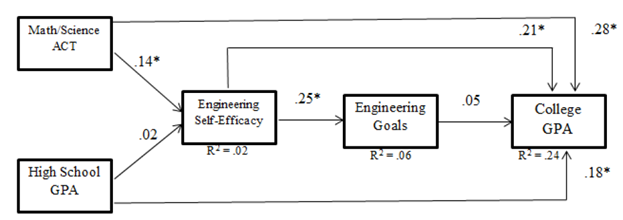Lee, H. S., Flores, L. Y., Kanagui-Munoz, M., & Navarro, R. L. Social cognitive predictors of the academic performance of engineering majors. Revise and resubmit. (Lee et al., revise and resubmit)
Using a SCCT model of academic performance, does past academic performance (i.e., math/science ACT scores & high school GPA), engineering self-efficacy, and engineering goals influence current academic performance (college GPA)? Do these relations in the model differ across men and women? Do these relations differ across Latino/as and Whites?

Key Findings:
General Findings
- The SCCT academic performance model was helpful in predicting engineering students’ college GPA.
- Students’ past academic performance and engineering self-efficacy related to their college GPA in engineering.
- Engineering goals did not influence college GPA. Only math/ Science ACT scores predicted engineering self-efficacy.
Gender
- Women and men did not differ in their College GPA.
Racial differences
- White students had a relationship between their self-efficacy and engineering goals, while Latino/a students did not.
- Latino/a ACT scores influenced college GPA, while White students did not.
Implications:
- It is important for engineering students (especially women and Latino/as students) to have successful academic experiences in math and science their early education high levels in order to lead to high engineering self-efficacy in college.
- Educational programs can focus on enhancing college GPA of students through the development of engineering self-efficacy. Affirmation statements such as “I have enough capability to complete the task can be helpful for female and Latina/o students in engineering to increase their academic job performance in their future. Encouragement from family and facilities can boost their confidence in helping them achieve academic success engineering and providing verbal encouragement or role models. Mentorship might be helpful as well.
- Engineering goals may not translate into academic performance for women or Latino/a engineering students due to the presence of perceived academic or career barriers.
- Latina/o students may have high self confidence in their ability to successfully accomplish academic tasks in engineering but less likely to pursue a career in engineering than a similarly confident white student. This suggests that different mechanisms may operate in the development of career goals between white and Latino/a students in engineering. Educators or academic intervention program should explore the reasons why Latino/a students who have high self-efficacy may want to pursue an engineering career. An application of this finding is to consider improving the academic and work environments by creating a more welcoming climate for Latino/a students in providing positive role model sin engineering departments.
- Interventions for support for math/ science domains in high school play a significant role for Latino/a students in accomplishing academic tasks successfully in engineering at college. It could mean the Latinos are more influenced by these tests compared to white students.
|



